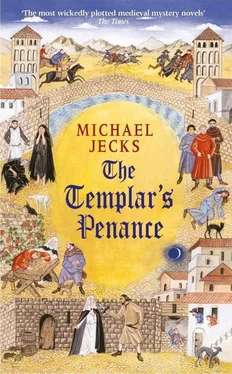Michael Jecks - The Templar
Здесь есть возможность читать онлайн «Michael Jecks - The Templar» весь текст электронной книги совершенно бесплатно (целиком полную версию без сокращений). В некоторых случаях можно слушать аудио, скачать через торрент в формате fb2 и присутствует краткое содержание. Год выпуска: 2014, ISBN: 2014, Издательство: Headline, Жанр: Исторический детектив, на английском языке. Описание произведения, (предисловие) а так же отзывы посетителей доступны на портале библиотеки ЛибКат.
- Название:The Templar
- Автор:
- Издательство:Headline
- Жанр:
- Год:2014
- ISBN:9781472219763
- Рейтинг книги:4 / 5. Голосов: 1
-
Избранное:Добавить в избранное
- Отзывы:
-
Ваша оценка:
- 80
- 1
- 2
- 3
- 4
- 5
The Templar: краткое содержание, описание и аннотация
Предлагаем к чтению аннотацию, описание, краткое содержание или предисловие (зависит от того, что написал сам автор книги «The Templar»). Если вы не нашли необходимую информацию о книге — напишите в комментариях, мы постараемся отыскать её.
The Templar — читать онлайн бесплатно полную книгу (весь текст) целиком
Ниже представлен текст книги, разбитый по страницам. Система сохранения места последней прочитанной страницы, позволяет с удобством читать онлайн бесплатно книгу «The Templar», без необходимости каждый раз заново искать на чём Вы остановились. Поставьте закладку, и сможете в любой момент перейти на страницу, на которой закончили чтение.
Интервал:
Закладка:
Listening to him, Gregory stiffened in dislike. It was as though the other man was uninterested in the lives or deaths of the pilgrims, but had simply become involved because he had seen the opportunity for a battle. Some knights were that way, Gregory knew. He himself had once been equally selfish, with a disinterest in other men’s lives and works. Like other knights he had enjoyed his wine, chased the women, and sought only earthly delights. And there were few pleasures greater than slaying your enemies and seeing their comrades fleeing the field, leaving you and your fellow knights in sole occupation.
Yet he had changed. Since that terrible time when he had lost his wife, he had grown more philosophical, more open to other people. Certainly, he knew glancing at the fair-haired man at his side, he had never been so callous as Sir Charles.
‘Are you here on pilgrimage?’ he asked.
Sir Charles peered at him as though he had forgotten he was there. ‘No. I am on my way to see if I can help my friend Afonso. He wants to kill a man,’ he said blandly, smiled, and was gone.
Gregory puffed out his cheeks and slowly relaxed. Thank God the man was gone. He was an unsettling fellow. Surely even when Gregory himself had been at the height of his self-confidence, he had never been as arrogant as that. Sir Charles seemed to be content to go through life as though he was careless of any man’s feelings. That was no way to live. It was like being possessed of a deathwish.
Perhaps it was only his way of joking, Gregory wondered, but then he shook his head. The fellow had seemed perfectly serious.
Gregory felt uneasy suddenly, standing with his back to wherever Sir Charles had gone. In preference, he moved forward through the crush. He had seen Frey Ramon carrying the body out of the square, and there had been a stillness in the crowds as though it was a rare, terrible event. Funny how foreigners could react, he reflected — not for the first time.
Folk were beginning to resume their normal activities now. Hawkers began to shout their wares again, men bawled for wine at the taverns, and Gregory found his way was easier. Soon he was up at the front of the crowd, staring with vague curiosity at the men gathered there. A cart was being led away by one peasant, and a cleric was standing talking to three men while a physician was bent over a figure lying in a dead faint on the ground. The physician straightened, then set about striking a spark from his knife and a stone, blowing onto tinder. Gregory suddenly felt a dim recognition stirring in him. The bare arm which he could see looked rather familiar.
From closer, it was a great deal more familiar. There was a birthmark near the wrist. Oh, surely it couldn’t be her — not his wife!
The physician had at last made the tinder catch, and now he blew on it. When he had a large enough flame, he lit a candle, shielding it from the occasional gusts in the square, then held it near the unconscious woman’s face and burned a few feathers.
As the reeking smoke entered her nostrils, Dona Stefania retched, then coughed and moaned loudly. She pushed the noxious odour from her, and even as the physician smiled and tossed his feathers away, she winced and sat up. ‘What …’
She was assailed by sudden nausea, and had to close her eyes for a moment. ‘What is happening?’ she asked dully, and then she began to weep as she remembered the body of her maid, remembered that shattered remnant of a face.
Simon was saddened to see a noblewoman brought so low by circumstances, but he could easily understand her feelings. A pilgrim, many miles from her home, the only companion she would have had was her maid, and now the latter had been snatched away. It was a fearfully lonely life for a woman, no matter how well-filled her purse, if she were left alone. Bad enough to lose a husband, but in some ways Simon thought that for a woman, losing a maid or manservant was worse. The companionship was usually easier and more genuine between master and servant than that which prevailed between married partners.
No one could doubt the genuine sadness of the woman. She had collapsed at the sight of her maid, and now she wept uncontrollably. It was the sort of behaviour that no one of her station would normally indulge in. They wouldn’t want people to think they were so weakly as to become too closely attached to their staff. All too often people did, of course: the number of widows who married their husbands’ stewards was eloquent proof of that.
Rather than contemplate the wailing woman, Simon turned away. Nearby was a woman clad in black, wandering among the crowds. He watched her irritably, half aware of Baldwin arriving at his side.
‘Another ruddy beggar,’ he grouched. ‘There seem to be more of them than pilgrims.’
‘Do not be too harsh,’ Baldwin remonstrated gently. ‘Some are genuine enough.’
Simon winced. ‘I’m sorry, Baldwin. I didn’t mean to pass comment on your old companion. He’s obviously all right.’
‘Not many would agree with you,’ Baldwin said moodily, scuffing a boot on the paving and sending a pebble skittering over the slabs.
‘There is one thing that is beneficial about beggars, though,’ Simon said. ‘Come with me.’
Surprised, Baldwin obediently followed Simon to the edge of the crowds. The beggarwoman in black was moaning gently, a hand wrapped in filthy linen held out to any who passed within her range. There was a repellent odour about her, with a faint hint of lemons, as though she had slept beneath a grove of citrus. Simon caught sight of a pale face beneath her hood, but averted his eyes automatically. One didn’t meet their gaze, because that lent their begging legitimacy and let them feel that they could ask for more money.
‘You speak English?’ he demanded gruffly.
‘Si — a leetle, Senor.’
‘You walk about the crowds here. Did you see the woman with the blue tunic before, the woman who was killed?’
‘I saw her with the Dona there. She was maid to her, called Joana.’
Baldwin smiled as he understood Simon’s reason for questioning this beggar. A beggar could pass through a crowd unnoticed, ignored, as irrelevant as a cur, but might still notice others and make comment about them.
Simon saw his understanding dawn. ‘Today, did you see her leave the city?’
‘Si. She left by the Porta Francigena after lunch.’
‘Was she alone?’
There was a long pause, and then the woman spoke as if reluctantly. ‘I think she was with a man. Perhaps I am wrong, but he was behind her — a tall, dark knight. I have seen him. He is called Don Ruy, I think. A pilgrim to Compostela.’
‘You think he and she were going to a rendezvous?’ Baldwin asked.
‘I do not think she saw him, but he had eyes only for her.’
‘They were both walking?’
‘No. Both were on horseback.’
‘We may need you to speak to the Pesquisidor ,’ Simon said sternly.
‘I am always here in the square,’ she said sadly, and her hand rose a little.
Simon grunted, but he reached into his purse and pulled out a coin. ‘Very well. What is your name?’
‘What need has a beggar of a name?’ she asked softly. ‘I have lost my husband, my home, my station. But I have been called Maria. My father called me that. You may, too. Maria of Venialbo.’
‘Very good,’ Simon said and dropped the coin into her palm.
Chapter Eight
Domingo had watched dully while the men with the body on the cart passed, going towards the Cathedral, but it meant nothing to him. Nothing did, not since the death of Sancho. Life itself had lost its meaning. All that mattered was finding the fair man and executing him. Standing with his men in front of the tavern, he drained his cup and belched.
Читать дальшеИнтервал:
Закладка:
Похожие книги на «The Templar»
Представляем Вашему вниманию похожие книги на «The Templar» списком для выбора. Мы отобрали схожую по названию и смыслу литературу в надежде предоставить читателям больше вариантов отыскать новые, интересные, ещё непрочитанные произведения.
Обсуждение, отзывы о книге «The Templar» и просто собственные мнения читателей. Оставьте ваши комментарии, напишите, что Вы думаете о произведении, его смысле или главных героях. Укажите что конкретно понравилось, а что нет, и почему Вы так считаете.












